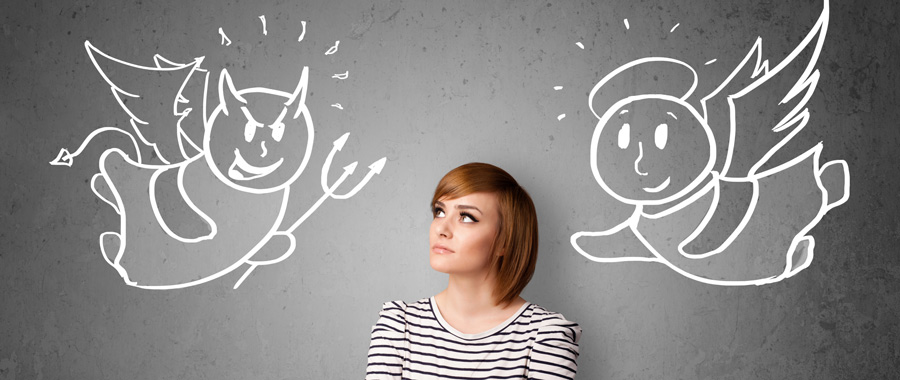In the rich tapestry of human experience, the dichotomy between good and evil has been a perennial theme, captivating the minds of philosophers, theologians, and casual observers alike. Within the Bahá’í teachings, this perennial question is illuminated through the allegorical concept of angels and devils, often depicted as entities that vie for influence over human souls. The question arises: are angels and devils truly perched upon our shoulders, guiding our actions and thoughts? To explore this notion, we must delve into various aspects of Bahá’í philosophy, ethics, and spiritual practices.
First and foremost, Bahá’í teachings posit the existence of both spiritual and material realities. Humans are viewed as dual beings, possessing both physical bodies and spiritual essences. The interplay between these dimensions becomes evident in our moral choices. In this framework, angels symbolize the divine attributes and virtues—qualities such as love, compassion, and wisdom. Conversely, devils represent the baser instincts and impulses within humans, which may lead to selfishness, hatred, and discord. This duality is not simply a fanciful metaphor; it embraces the essence of the human condition, wherein the struggle between these forces provokes significant contemplation.
Moreover, Bahá’í scripture establishes that personal development and spiritual growth stem from the conscious pursuit of virtues. Each individual bears the power to cultivate their inner qualities, akin to nurturing a garden. In doing so, it becomes imperative to recognize the ‘angels’ that inspire noble thoughts and deeds, while simultaneously identifying the ‘devils’ that might incite negative behaviors. This introspective journey necessitates an active engagement with one’s conscience and a commitment to self-improvement. Through prayer, meditation, and community service, Bahá’ís endeavor to foster their angelic attributes while diminishing the hold of the negative aspects of their nature.
The concept of human agency is paramount within Bahá’í philosophy. Humans are endowed with free will, granting them the autonomy to make choices that align with their highest ideals or succumb to lower inclinations. This autonomy suggests that rather than literal embodiments of good and evil, angels and devils exist as abstract representations of the inner struggles each individual faces. When one embodies honesty and integrity, they manifest the ‘angelic’ aspect. Conversely, when they yield to deceit and malice, they succumb to the ‘devilish’ side of their nature. Thus transcends the simplistic portrayal of angels and devils as external entities; they are reflective of the eternal conflict within the human soul.
In light of this understanding, Bahá’í teachings advocate for the necessity of spiritual education. The acquisition of knowledge serves to illuminate the paths of virtue while dispelling the darkness of ignorance. Engaging with spiritual literature, participating in community discussions, and receiving guidance from mentors are all vital processes that empower individuals. Such practices contribute to the enlightenment of one’s spiritual consciousness, allowing for greater discernment of the influences at play within oneself. It becomes evident that knowledge acts as a preemptive shield against the lure of negative inclinations.
Furthermore, the notion of interconnectedness in Bahá’í belief reiterates the significance of societal influence on individual actions. The community plays an integral role in shaping moral standards and ethical perceptions. When individuals are surrounded by a supportive environment that uplifts virtues, the aspirational ‘angels’ are amplifying their presence. Conversely, when negativity prevails, it can create a breeding ground for destructive behaviors. This underscores the social responsibility to foster spaces that cultivate virtue-laden living, thereby amplifying the impact of the ‘angelic’ qualities collectively.
Additionally, the importance of unity becomes a thematic pillar within Bahá’í teachings. The need for unity transcends individual pursuits and extends to the collective effort of humanity in overcoming its basest tendencies. The ‘devilish’ inclinations that lead to division, prejudice, and conflict can be mitigated through acts of solidarity and communal harmony. Therefore, by collectively striving toward betterment, the Bahá’í community reinforces the presence of ‘angels’ in their midst, promoting an ethos rooted in compassion and kinship.
An intriguing aspect of Bahá’í belief is the acknowledgment of the progressive revelation of truth. Each manifestation of God, from Moses to Muhammad to Bahá’u’lláh, has introduced teachings that address the evolving needs of humanity. These teachings elucidate the inherent faculties of the human spirit, further refining the concepts of good and evil through a lens of progressively deepening understanding. As societies evolve, so too does the perception of the angelic and devilish, inviting constant reflection and growth.
In summation, the depiction of angels and devils in Bahá’í thought serves as a profound metaphor for the intrinsic conflicts woven into the fabric of human existence. By viewing these entities as representations of our highest aspirations and basest inclinations, individuals are called to engage actively in their spiritual development. Seeking knowledge, promoting unity, and facilitating community upliftment delineate the paths that cultivate virtuous living. Through this, the notion of angels and devils occupies a space not external to us but rooted deeply within each individual, urging us to choose wisely as we navigate the complexities of life.
